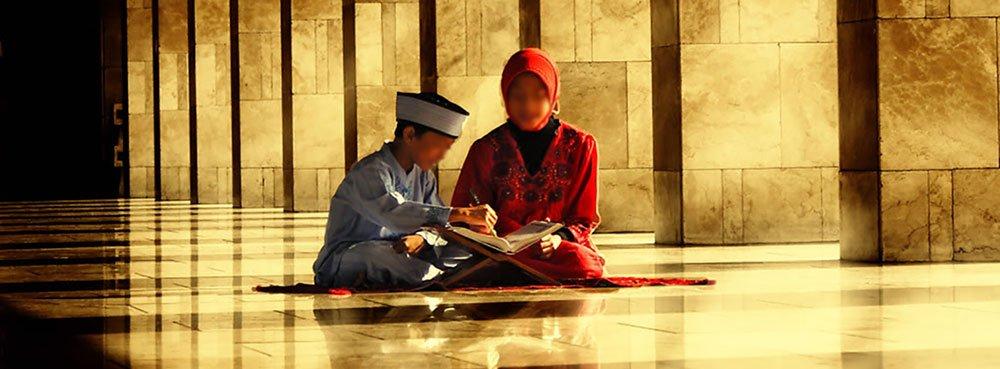THE exploitation of women in the name of tahleel marriage has surfaced and caused a lot of debate. This practice mainly on the backdrop of “triple talaaq” has been going on under cover for ages in countries like India.
But it was condemned by the Prophet (ﷺ) and has no sanction in Islamic law.
What Is Tahleel Marriage?
Tahleel, known as “halala” in the Indian subcontinent, is a marriage conducted between a thrice divorced woman and a man who marries her with the agreement to divorce her so that she becomes halaal (lawful) for her previous husband to marry.
This occurs after the previous husband has divorced her thrice, usually in a questionable manner.
The saddest part is that the whole matter is misconstrued as being part of Islam. This is not true.
How did it come to be regarded as such? Let’s find out.
Marriage And Divorce In Islam
Marriage is a sacred institution in Islam. When a man and a woman get married, they enter into a sacred bond that grows into a family, which becomes the cornerstone of a society. Islam encourages us to keep our marriages healthy and positive.
However, not every marriage is a success; thus Islamic law provides a means to terminate a marriage contract in case the partners are simply not harmonious with each other and all attempts at reconciliation are futile.
For such unfortunate circumstances, Islam has allowed us divorce as a mercy.
A marriage can be terminated in many ways, primarily by a husband when he pronounces a divorce. A woman may seek separation through khulʽa if he refuses to divorce her.
The Process Of Divorce In Islam
The issue will be understood better with a glance at the divorce process in Islam. Allah has said:
“And when you divorce women and they have (nearly) fulfilled their term, either retain them according to acceptable terms or release them according to acceptable terms, and do not keep them, intending harm, to transgress (against them). And whoever does that has certainly wronged himself. And do not take the verses of Allah in jest. And remember the favor of Allah upon you and what has been revealed to you of the Book and wisdom by which He instructs you. And fear Allah and know that Allah is Knowing of all things.” (Qur’an, 2:231)
When a man divorces his wife, she enters into a waiting period known as ʽiddah, which lasts for three monthly cycles.
Until the expiry of this period, the husband has the option to take her back if he regrets his decision. If he does not take her back and the period expires, the divorce is complete. If they wish to come back together, they must marry again with a new contract. [Also read: 5 Questions To Ask Before You Take The Marriage Plunge]
But if he cancels the divorce before the period expires, the marriage remains although he had pronounced one divorce. He can revoke a second divorce in the same way. The Qur’an describes the procedure in Surah al-Baqarah:
Divorce is twice. Then, either keep (her) in an acceptable manner or release (her) with good treatment. (Qur’an, 2:229)
However, the third divorce is irrevocable and they cannot remarry under normal circumstances. After pronouncing the third, irrevocable divorce, the only way the couple can remarry is if the woman marries another man, consummates the marriage, and is divorced or her husband dies.
But it cannot be done intentionally. And this is where the issue of tahleel marriage comes into the picture.
And if he has divorced her (for the third time), then she is not lawful to him afterward until (after) she marries a husband other than him. And if the latter husband divorces her (or dies), there is no blame upon the woman and her former husband for returning to each other if they think that they can keep (within) the limits of Allah . These are the limits of Allah, which He makes clear to a people who know. (Qur’an, 2:230)
What the law essentially says is: After a husband divorces his wife thrice, he has lost her and cannot get back with her. However, if in the course of her life, the wife marries another man and for some reason her second marriage comes to an end, thereafter she is free to marry any man, and her first husband now stands a chance to come up as a potential candidate for marriage with her. In other words, she will then be halaal for him to marry.
The Quran is not talking about an arrangement whereby events are planned to make the ex-wife permissible for her husband; rather it is talking about a possibility, however slight, which may arise over a natural course of time, and yes, in an unplanned manner.
Tahleel marriage on the other hand is a scam where an irrevocably divorced woman is married to a man (fraudster) who will divorce her soon after consummation. This violates Islamic law on many counts.
Evidence Against Tahleel Marriage
Marriage in Islam must be approached with the intention of continuity and seeking chastity. Temporary marriage is illegal in Islam and the concept of tahleel marriage was condemned by the Prophet. Such a marriage is invalid.
The Prophet (ﷺ) said, “Curse be upon the one who marries a divorced woman with the intention of making her lawful for her former husband and upon the one for whom she is made lawful.” [Sunan Abi Dawud, # 2076]
After the Prophet (ﷺ), the companions were strict in upholding its prohibition as well. ʽUmar (radhi Allahu ‘anhu) is reported to have said, “By Allah, no muhallil or muhallal lahu will be brought to me but I will stone them.”
Scholars from all times have denounced the practice condemning it as a mockery of the laws of Islam.
To quote, Shaikh Abdul Aziz bin Baaz (rahimahullah) said,
“This is one of the worst kinds of mischief. Such a man is considered an adulterer, because he does not marry this woman for the purpose of true marriage, chastity, and procreation; he only intends to make it lawful for her husband to return to her by a one-time sexual encounter. This marriage is void, and not Shar`i (Islamically lawful). If this is known, she is not considered lawful for her ex-husband.” (20/277)
Fatwas of the Permanent Committee states that the “contract is batil (null and void) and the marriage is invalid”.
Ibn Taymiyyah, rahimahullah, mentioned that regardless of whether the condition was stipulated in the contract and whether the previous husband knew of his (the second husband’s) intention, the marriage is still invalid.
He said, “This is what is elucidated by the Book and Sunnah and what is narrated from the Companions of the Prophet (ﷺ) and the majority of the followers of companions and the majority of the jurists (fuqahaa) of Islam.” (Quoted from Bayan Al-Daleel ‘Ala Butlan Al-Tahleel by Imam Ibn Taymiyyah)
Therefore, an arranged tahleel is an illegitimate relationship and consequently, the marriage with the first husband with whom she comes to live with (after the arrangement is concluded) will also be illegitimate.
A Root Cause: ‘Triple Talaaq’
The emergence of nikah tahleel is a consequence of an incorrect form of divorce known as “triple talaaq” and is considered an innovation (bid`ah) in Islam. Triple talaaq is when a man pronounces divorce thrice at one sitting – three times in one go.
With scant control over temper, some men tend to decide hastily to divorce the wife permanently and pronounce three divorces. However, with the return of sobriety and the dawn of regrets, he resorts to tahleel as the only choice – except that it isn’t a choice.
The belief that three divorces at a time ends the marriage permanently is another misconception. Though some scholars do opine that, the correct view is that to utter divorce three times in a row at one sitting is counted as one, not three. This is based on the following narration recorded in Saheeh Muslim:
Ibn ‘Abbas (may Allah be pleased with him) reported that the pronouncement of three divorces during the lifetime of Allah’s Messenger (ﷺ) and that of Abu Bakr and two years of the caliphate of ʽUmar was treated as one. But ʽUmar bin al-Khattab said, “Verily the people have begun to hasten in the matter in which they are required to observe respite. So he imposed it upon them. [Saheeh Muslim, #1472]
The sound and correct divorce, as mentioned above, is a process. The three divorces should only happen at distinct periods and each divorce has a process of its own.
Wisdom Of The Islamic Divorce Process
In earlier times, there was no limit to the number of divorces a man could give his wife so he would divorce and take her back as many times as he wished. Islam limited the number of divorces to two; thereafter he loses his right to remarry her.
This law keeps a husband from issuing divorces recklessly at every petty fight, pushes them to act rationally and prevents them from using divorce as a weapon of threat or manipulation.
It closes the door to abuse of women. If a husband loves his wife and wishes to stay with her, should he not respect their relationship and be cautious with words that would tear them apart?
Islam promotes reconciliation between a husband and wife. Thus, Allah has legislated divorce as a lengthy process and given the couple many opportunities throughout the process to sort out matters and preserve their bond.
Following the correct procedure, if a couple wish a permanent divorce, each utterance of divorce must be followed by a waiting period. After so much time and thought is put into the decision, there is a slim chance that the couple would regret the decision later in life.
Muslims Abused Due To Ignorance
The ignorance of the Muslim Ummah has been exploited, and a business is made out of the desperation of some divorced women who wish to get back with their husbands who have hastily pronounced divorce to them only to later regret it. Money is demanded to provide the “service” of marrying the divorced woman, consummating the marriage and then divorcing them.
This is nothing but a sheer mockery of the laws that are laid down by Allah to protect the prestige and honor of a woman.
Online sites and pages have been created offering marriage and a night or more with the client in exchange for a fee. Financial pressure and pressure from the society force a woman to opt for tahleel encouraged by the ex-husband. It is a physical and mental misery for women and undermines the aims of the Shariʽah.
Lack of Islamic awareness among common Muslims is one of the main reasons why such practices are being carried out.
Deviant practices like triple divorce and tahleel marriage are neither a means nor a solution, and result in devastated women who fall prey to tahleel services and face exploitation, blackmail, and sexual abuse. They may even be trapped in the tahleel marriage if the second husband defaults on his promise.
Obedience to the Islamic laws of divorce would drastically reduce passionate decisions that lead to regrets. It would also abolish the exploitative practice of tahleel marriages that devastate women sexually and financially.
Limited free articles. Subscribe for full access.








 Dr. Bilal Philips
Dr. Bilal Philips